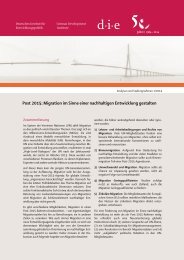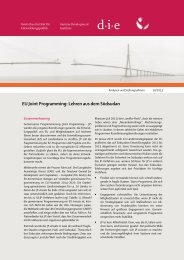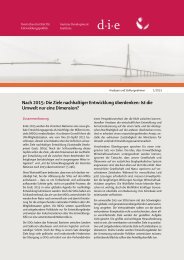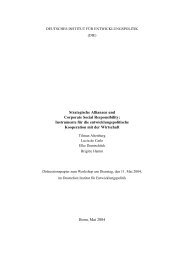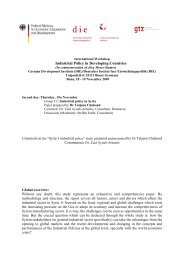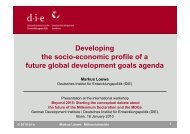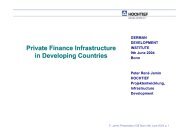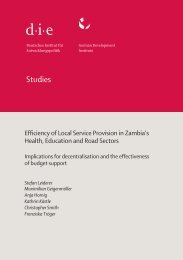Middle East / North Africa and the Millennium Development Goals ...
Middle East / North Africa and the Millennium Development Goals ...
Middle East / North Africa and the Millennium Development Goals ...
You also want an ePaper? Increase the reach of your titles
YUMPU automatically turns print PDFs into web optimized ePapers that Google loves.
Markus Loewe<br />
Never<strong>the</strong>less, what follows will attempt to check <strong>the</strong> priorities set by German<br />
DC in <strong>the</strong> MENA region against <strong>the</strong> present state of <strong>the</strong> <strong>Millennium</strong><br />
process in <strong>the</strong> individual partner countries, <strong>the</strong> aim being to go on from<br />
here to formulate propositions on a different future orientation of German<br />
DC towards sectors as viewed from <strong>the</strong> perspective of <strong>the</strong> MDG agenda.<br />
The following assumptions were made for this purpose:<br />
– The MDG agenda is a consistent system of goals that are closely interrelated<br />
(Satterthwaite 2004). This means that measures conceived<br />
to help implement one MDG usually have positive impacts on several<br />
of <strong>the</strong> o<strong>the</strong>r MDGs as well. It is <strong>the</strong>refore important to distinguish between<br />
direct <strong>and</strong> indirect effects. What follows will start out by focusing<br />
on <strong>the</strong> direct effects of DC. Indirect effects of DC are not unmistakably<br />
indicated by its sectoral orientation. Only a detailed portfolio<br />
analysis of individual priority areas could provide <strong>the</strong> necessary information<br />
for that.<br />
– As a rule, DC in <strong>the</strong> health sector entails direct effects on MDGs 4, 5,<br />
<strong>and</strong> 6 – although <strong>the</strong>se impacts may differ substantially in <strong>the</strong>ir significance.<br />
Indirect effects are possible mainly for MDG1, MDG2, <strong>and</strong><br />
MDG3.<br />
– Much <strong>the</strong> same can be said for DC in <strong>the</strong> education sector, which<br />
contributes principally to implementing MDG2 <strong>and</strong> MDG3, although<br />
it may also have indirect effects on all o<strong>the</strong>r MDGs.<br />
– DC in <strong>the</strong> environmental sector is of course keyed to MDG7 / Target<br />
9. Whe<strong>the</strong>r this also entails positive impacts on o<strong>the</strong>r goals is a<br />
question that can be answered only for concrete cases. The most likely<br />
assumption would be more or less long-term effects on MDG1.<br />
– It is less clear which goals are fur<strong>the</strong>red by DC in <strong>the</strong> water sector. It<br />
has already been pointed out in Chapter 3 that in <strong>the</strong> water-poor<br />
MENA countries a conflict may arise between <strong>the</strong> goal of providing<br />
accesses to drinking water for as much of <strong>the</strong> population as possible<br />
(Target 10) <strong>and</strong> <strong>the</strong> goal of making sustainable use of available water<br />
resources (Target 9). As it has itself stated, German DC remains<br />
committed to <strong>the</strong> goal of sustainability in <strong>the</strong> water sector (Arce<br />
2004). It is <strong>the</strong>refore assumed below that German DC in this sector<br />
too provides a direct contribution not only to Target 10 but also to<br />
Target 9 (however great this contribution may in fact be). Fur<strong>the</strong>rmore,<br />
<strong>the</strong>re is good reason to expect significant indirect impacts on<br />
MDG4 <strong>and</strong> MDG5, since improved access to drinking water as a rule<br />
translates out into improved health <strong>and</strong>, above all, lower child mortal-<br />
128 German <strong>Development</strong> Institute



